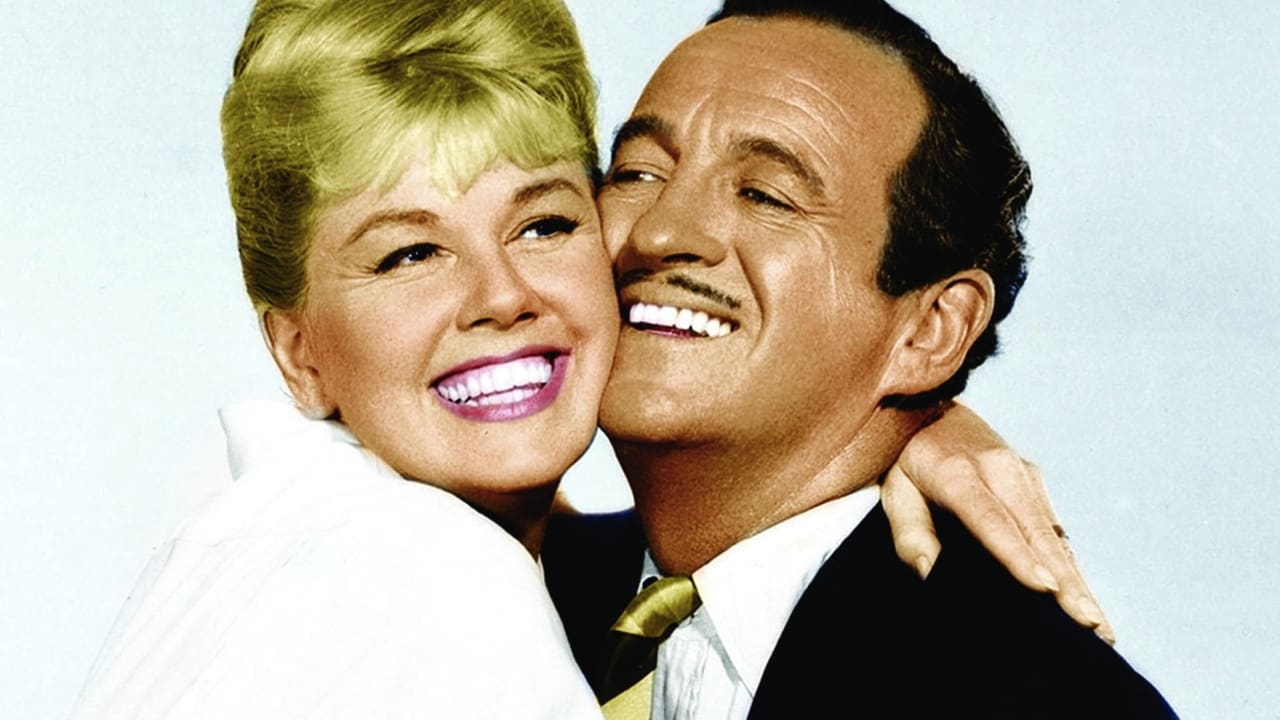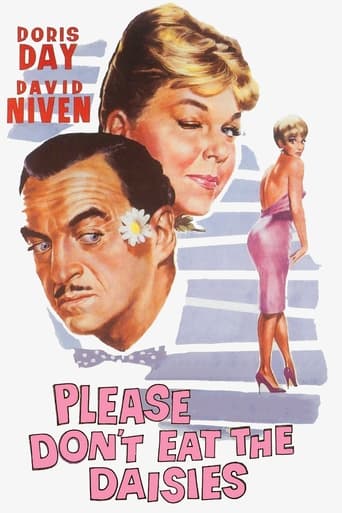ada
the leading man is my tpye
Diagonaldi
Very well executed
GamerTab
That was an excellent one.
Gurlyndrobb
While it doesn't offer any answers, it both thrills and makes you think.
lasttimeisaw
Heard the news that Doris Day might have a comeback in Clint Eastwood's at the age of 93, after her full retirement from showbiz in 1973 (which later have been dismissed as a rumour), timely reminds that I have never watched any of her films, so the introduction piece is this family-friendly comedy inspired by Jean Kerr's 1957 best-selling collection about her mode of living in suburb while raising four boys.Doris Day plays Kate, married to a professor-turned-drama-critic Lawrence Mackay (Niven), they live in a small apartment in NYC with four young boys, their lease is going to expire, so Kate is planning to move to the countryside, where they can afford to buy a larger house, good for their boys too. But Lawrence's new career requires him to be near theatres in the city, and he also enjoys the urban life and what it entails. Basically, the plot perfunctorily resolves around a series of lighthearted marital disagreements with four kids frolicking around and a scare-easy Spinone named Hobo.Day is given the superstar-treatment, apart from a dashing wardrobe, her Kate, is portrayed as a perfect housewife, obliging and graceful, with a good heart, whom one can take to social parties and back at home she can single-handedly manage four mischievous kids. She doesn't need to bother her husband while being in charge of the renovation of a rundown mansion and being maximal understanding when her husband is under stress or in a bad mood. During her leisure time, she volunteers to direct and star in an amateurish play for the local school, which mainly prepares a stage for Day to perform her singing and dancing routines.Niven, stays gentlemanlike in his comfort zone, his Lawrence is Kate's perfect match, as a theatre savant, whose influence is so puissant that he can close an entire play if he badmouths it, he struggles between his professional conscience and obligation for his friend Alfred North (Haydn), and incredibly levelheaded when a seductress Deborah Vaughn (a flashy Janis Paige) proposes an indecent suggestion. Also this film is Spring Byington's silver-screen curtain call, who plays Kate's mother and inculcates some rather olde worlde marital advices.Frankly speaking, PLEASE DON'T EAT THE DAISIES is a lukewarm comedy, no more than a time- killer in a lackadaisical evening, for die-hard fans of two leads only.
bkoganbing
Please Don't Eat The Daisies is an updating of Mr. Blandings Builds His Dream House from the woman's point of view. It's taken from a humorous book of the same title by Jean Kerr, wife of the New York Herald Tribune theater critic Walter Kerr. The Kerrs have four boys instead of two girls so we're talking about double the trouble.Trouble the children are indeed. The film actually opens with the four boys getting their baby brother to drop water balloons on poor passersby of their Manhattan apartment. Which in itself is getting too crowded. But when the real estate agent starts showing the apartment off just as their lease is expiring, Doris Day and David Niven have to move and move quickly.Like Cary Grant and Myrna Loy, they sink quite a bit of dollars into what we would now call a fix-it-up. But where Cary was hip deep in his involvement in the new house, David Niven is all caught up in his work as one of New York's drama critics. It's up to Doris to keep the household together and get the house livable.Niven's got his own troubles too, he breaks a friendship with an old friend Richard Haydn when he gives producer Haydn's play a bad review. Not to mention a public slap at Sardi's from Haydn's star Janis Paige who will match her fanny with anyone's. Janis did have quite the derrière back in the day.Haydn's really got a great scheme to get back at Niven for the bad review. It's a pip, you have to see Please Don't Eat The Daisies for.Doris gets to sing three songs, including the title song which became a big hit for her. It's perfectly suited to her style.She sings well and David Niven is as debonair and charming as he always is on the screen. The film even spawned a television series later on in the decade. Please Don't Eat The Daisies still holds up well as good family entertainment.
theowinthrop
In one of his novels, British Prime Minister Benjamin Disraeli makes a comment about people who make a career as "critics". He says they are people who failed in writing, acting, painting, and the arts in general. And that viewpoint has been the normal one that critics have faced throughout history. Aristophanes makes fun of them in one comedy where he has to have either Euripides or Aeschylus return from the dead to save Greek drama (Sophocles agrees not to get into the contest - he'll remain to take care of drama in the underworld!). So it goes through literature, particularly drama. Possibly the best spoof is Richard Sheridans' under produced comedy THE CRITIC, which is one of the funniest spoofs of playwriting in theater.The movies have not helped the love-hate image of critics. Look at such examples as Addison DeWitt in ALL ABOUT EVE, or Waldo Lydecker in LAURA. One is a cynical snake at times,and the other a killer. But Addison (based somewhat on the great George Jean Nathan) does have a good critical brain, and when you listen to his comments on theater they are enlightening. Moreover, he is the one who brings the really bad Eve Harrington to heel finally. As for Waldo, he does misuse his powers as an all-around critic (note how he attacks an artist named Jacoby when the latter starts dating Laura), but his comments have validity (we even see Laura laughing while reading the column. Waldo (based on Alexander Woolcott) is an intelligent critic, but egocentric, and sexually a mess (he's obviously gay, but deeply attracted to his female friend and protégée). He also is a first rate judge of character - note how he and the detective (MacPherson) end up agreeing about what a weak creep the socialite Shelby is.PLEASE DON'T EAT THE DAISYS was based on a novel by Jean Kerr, the wife of the critic for the Herald Tribune Walter Kerr (best remembered now for his excellent study THE SILENT CLOWNS about Chaplin, Keaton, Lloyd, Arbuckle, and the rest). Using her own family for the models of the novel, Kerr tells the story of critic Lawrence Mackay (David Niven), his wife Kate (Doris Day), their four sons, and dog, and how they face two momentous events: Lawrence's move to be chief Broadway critic on his newspaper, and their forced move to a suburban house.As another comment on this thread pointed out there is a plot theme borrowed from GEORGE WASHINGTON SLEPT HERE and MR. BLANDINGS BUILDS IS DREAM HOUSE about the problems about renovating an old house and making it livable again. This problem is compounded by Lawrence letting his new position go to is head. He is constantly returning to New York City either to go to plays, or to give lectures on the drama. Kate, of course, ends up having to watch the boys with her mother (Spring Byington) and her maid (Patsy Kelly), as well as getting the right furnishings for the house. This is not conducive to maintaining good relations between husband and wife.On top of this, Lawrence becomes very self-important. His mother has sent him a young man (Jack Weston) who has just written a play, figuring that Lawrence can give him some tips. In his smuggest way, Niven's Lawrence manages to turn the friendly Weston into a disgusted acquaintance by questioning not the structure or scenes or characters, but the choice of subject for the play (it's a biblical story). Worse, Lawrence treats his old producer friend Alfred North (Richard Haydn) scurvily by giving an "honest" opinion about a new comic review of his, starring a sexually hot actress Deborah Vaughn (Janis Page). The review takes it's author's view of the stage too highly, forgetting that the production was light-hearted, not Ibsen or Becket but Feydeau.Both producer and star want revenge - Vaughn slapping Lawrence in the face in a restaurant, and North thinking of showing off the truth about the critic's abilities. Chance plays into North's hands. Kate gets involved in an amateur acting group in their new community, and North sends her a play that they can do (only altering one detail: Lawrence wrote the play years earlier, and North changes the author's name). So the acting group (with Kate as star) practice and prepare to show the dismal work, which North intends to reveal as the work of Lawrence - but only after all the other leading critics of the other newspapers are on hand to see opening night!Yes it is a nightmare for a real critic - and Niven's Lawrence handles it...well as it should be handled. The production of the film is good, with nice set pieces. The "vampire" like lady shown the Mackays' apartment while they are caught unprepared (the building manager is left only with saying, "Poor Mr. Mackay...Poor Mrs. Mackay"), who is tough enough to not care if she puts everyone else on the street. Or the problems of Lawrence trying to break into his own house when everyone's asleep. It is a fine comedy, and certainly one of Day and Niven's best films (and the only one they ever made together).
ipra
Although made in 1960, this classic sampling of Doris Day fluff is more a product of the 50s than the coming decade of the 60s. As ever, Miss Day is gorgeous and perfectly turned out, this time the mother of four small boys, an aspiring playwright overshadowed by her theater critic husband, coping with a series of domestic crises while she attempts to move her family from a city apartment to an improbably ramshackle English-style country house. 'Improbable' is indeed the word for the entire plot of this movie, but then probability was seldom the reason we went to the movies in the 50s. Bouyed along by the bright force of Miss Day's personality, the light touch and easy charm of David Niven, and ably supported by Janice Paige, Spring Byington, and Richard Haydn, this pic has all the bouncy sweetness and escapism her fans so appreciate in Miss Day's work. So, if you are looking for a 2-hour time trip to what seems like a kinder and gentler time, don't mind bumping your nose against a few cultural idiosyncrasies of the 50s (and no Day fan can avoid that), enjoy discovering some charming but forgotten musical numbers, appreciate really great vintage clothes, and generally believe it is hard for Miss Day to do any wrong, this seldom-mentioned film is just the ticket!

